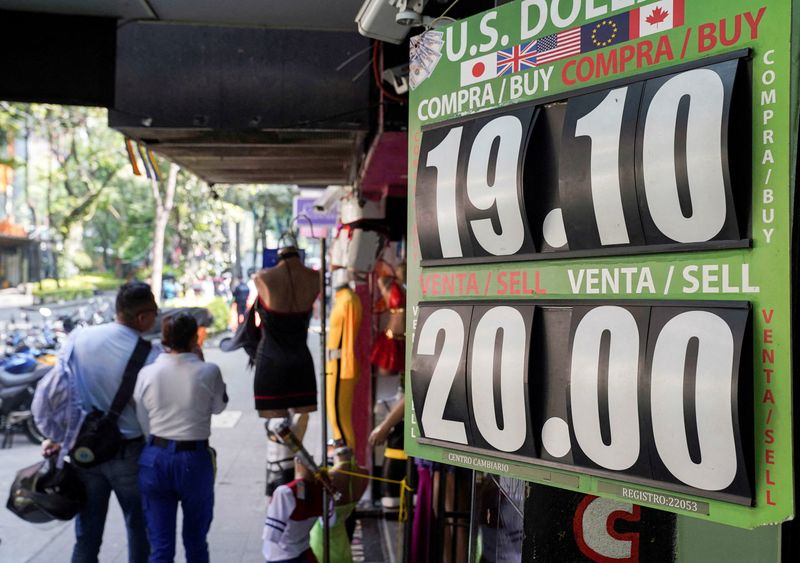By Laura Matthews and Saqib Iqbal Ahmed
NEW YORK (Reuters) – Multinational companies are strengthening their foreign exchange hedging strategies to protect their foreign earnings from wider currency swings that could result from a second Donald Trump presidency.
Since the U.S. election three weeks ago, strategists and bankers said they are seeing more interest in options and cross-currency swaps as companies, including those in the healthcare and industrial sectors, focus on how volatile currencies can be under Trump.
“The election is a big catalyst for hedgers to think about currency risk,” said Karl Schamotta, chief market strategist at payments firm Corpay in Toronto.
“Companies that have long been relatively comfortable with the direction and magnitude of exchange rate movements are being shaken by that complacency.”
Trump’s election is causing volatility in currency markets as his victory paves the way for tariffs and protectionist trade policies that characterized his first term.
Trump said Monday he would impose a 25% tariff on all products from Mexico and Canada on his first day in office, and an additional 10% tariff on Chinese goods, citing concerns about illegal immigration and illegal drugs.
The news sent the peso down as much as 2%, while the Canadian dollar fell as much as 1.4%.
The , which measures the strength of the U.S. currency against six peers, has risen 3.5% since the Nov. 5 election, largely on expectations that Trump’s trade and tariff policies will dollar will support. Scott Bessent, Trump’s chosen Treasury Secretary, favors a strong dollar and supports tariffs.
Adding to the uncertainty is the 2026 revision of the United States-Mexico-Canada trade deal, which set out tariff provisions and was implemented during Trump’s first term. Trump has said he plans to make the agreement “a much better deal,” although the details of the changes are unclear.
Trump’s first term, which was marked by wide swings in trade-sensitive currencies, highlighted the need for more hedging, analysts said.
At the same time, global central banks are trying to normalize interest rate policies while balancing concerns about growth and inflation, another potential source of volatility in the coming months.
About 94% of senior financial decision makers at UK and US companies said in a MillTechFX survey from November 7 to 18 that the US election result prompted them to change their foreign exchange hedging strategies.
Some are looking to extend the duration of the hedges, while others are looking to increase their hedge ratios: the portion of their total currency risk that is protected.
LOWER FOREIGN INCOME
The currencies that companies want to hedge include the Mexican peso and the euro.
A stronger dollar means U.S. companies’ foreign earnings are worth less when converted into dollars, eroding profits. According to John Butters, senior earnings analyst at FactSet, this generates 41% of sales outside the US.
The Mexican peso, which has fallen 2% since the election and nearly 17% this year since Monday’s close, is particularly in Trump’s crosshairs. The close U.S. trading partner is vulnerable to tariffs, which could disrupt companies’ supply chains.
While the interest rate differential between the U.S. and Mexico has narrowed since the election, the cost of hedging long peso positions has risen due to the peso’s decline, said Paula Comings, head of foreign exchange sales at US Bank.
“Those selling MXN and buying dollars may be reluctant to increase their forward hedging volumes at this time, but are looking at options as a possible alternative,” Comings said.
Companies are also facing tighter credit criteria from lenders and rising hedging costs, said Tom Hoyle, director of business development at MillTechFX, a currency trading platform that has increased the use of currency options.
“If companies want to protect themselves in the longer term, they will ultimately either have to absorb higher costs or look for alternatives,” he added.
According to the survey, many companies expect trade uncertainty to also weigh heavily on East Asia and Europe.
According to Comings, the impact on the euro, which has fallen about 4% against the dollar since the election, was not as deeply priced in before the election as the currencies of Mexico and China. The country is now under pressure from tariff talks, an ailing German economy and weak manufacturing in parts of Europe.

In Comings we see some US healthcare and industrial companies showing interest in using euro cross-currency swaps to manage currency risks and lower their interest payments. The annual return on these euro/dollar contracts has risen since the elections to as much as 2% on contracts of two years or longer, underscoring the attractiveness of these contracts.
“The election results have heightened the need to understand the extent to which some companies may not be able to afford to do business internationally if additional tariffs and/or regulations also need to be factored in,” said Juan Perez, director of trade. at Monex USA.


